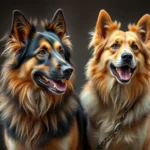
Introduction
Understanding different dog breeds is essential for prospective pet owners. Each breed comes with its own unique characteristics, history, and requirements. One such breed that has captured the hearts of many is the Kishu Ken. Originating from Japan, this breed is known for its hunting prowess, loyalty, and striking appearance. In this article, we will explore the Kishu Ken in-depth, including its origin, characteristics, care requirements, and how it compares to other breeds.
Understanding Dog Breeds
Definition of Dog Breeds
A dog breed is a specific group of domestic dogs with distinct characteristics, behaviors, and appearances. These traits have been selectively bred over generations, resulting in various breeds that serve different purposes. Understanding these characteristics is crucial for potential owners, as they can influence training, care, and compatibility with family life.
History of Dog Breeding
The history of dog breeding dates back thousands of years. Early humans began domesticating wolves, which eventually led to the development of various breeds tailored for specific tasks, such as hunting, herding, and guarding. Over time, the need for companionship has also influenced breeding practices, resulting in a diverse array of breeds that cater to various lifestyles and preferences.
Purpose of Different Dog Breeds
Dog breeds can be broadly categorized based on their primary purpose:
– Working Dogs: Bred for specific tasks such as herding, guarding, or search-and-rescue.
– Companion Dogs: Focused on providing companionship and emotional support.
– Show Dogs: Bred to meet specific breed standards for competitions.
Understanding the purpose behind a breed can greatly influence its temperament, training needs, and suitability for different living conditions.
The Kishu Ken: An Overview
Origin and History
The Kishu Ken hails from the mountainous regions of Japan, specifically the Kishu region. This breed has a rich history as a hunting dog, primarily used for tracking and hunting large game such as boar and deer. Its lineage can be traced back over 3,000 years, making it one of Japan’s oldest native breeds. The Kishu Ken is revered in Japan not only for its hunting skills but also for its loyalty and strong bond with its owners.
Physical Characteristics
The Kishu Ken is a medium-sized dog, typically weighing between 40 to 65 pounds and standing about 17 to 22 inches tall at the shoulder. Its coat is short, dense, and weather-resistant, with common colors including white, red, brindle, and sesame (red with black-tipped hairs). One of the breed’s most distinctive features is its curled tail, which adds to its elegant appearance. The Kishu Ken has a strong, athletic build, indicative of its hunting background.
Temperament and Behavior
The Kishu Ken is known for its independent and confident nature. While they are loyal and protective of their families, they can be reserved around strangers. This breed typically has a calm demeanor but requires proper socialization from a young age to ensure they are well-adjusted. They are intelligent dogs that thrive on mental stimulation and enjoy engaging activities. Families with children or other pets may find that the Kishu Ken can adapt well, provided it is introduced properly and socialized sufficiently.
Kishu Ken Care and Maintenance
Dietary Needs
The Kishu Ken requires a balanced diet that meets its nutritional needs. High-quality dog food formulated for medium to large breeds is recommended, ensuring it contains adequate protein, fats, and essential vitamins and minerals. It’s also crucial to monitor their weight, as this breed can be prone to obesity if overfed. Common dietary issues include food allergies, so consulting a veterinarian regarding the best diet for your Kishu Ken is advisable.
Grooming Requirements
Although the Kishu Ken has a short coat, regular grooming is essential to keep its fur healthy and free of debris. Brushing once a week is typically sufficient, though more frequent brushing may be necessary during shedding seasons. Bathing should be done as needed, but not too frequently, as it can strip the coat of natural oils. Nail trimming, ear cleaning, and dental care should also be incorporated into a regular grooming routine.
Exercise and Training
The Kishu Ken is an active breed that requires daily exercise to maintain its physical and mental well-being. This can include long walks, runs, or playtime in a secure yard. Engaging in activities such as agility training or obedience classes can also provide the necessary mental stimulation. Training should be approached with consistency and positive reinforcement, as this breed can be stubborn if not motivated properly.
Health Considerations
While the Kishu Ken is generally healthy, it may be prone to certain health issues, such as hip dysplasia or eye problems. Regular veterinary check-ups and vaccinations are vital to maintaining their health. Early detection of any health concerns can lead to more effective treatment, ensuring a long and happy life for your Kishu Ken.
Pros and Cons of Owning a Kishu Ken
Advantages
Owning a Kishu Ken comes with many advantages:
– Loyalty and Companionship: This breed forms strong bonds with its family and is known for its loyalty.
– Intelligence and Trainability: The Kishu Ken is intelligent and learns quickly when properly motivated.
– Adaptability: They can adapt to various living situations, from apartments to homes with large yards, as long as their exercise needs are met.
Disadvantages
However, there are challenges associated with this breed:
– Training and Socialization: The Kishu Ken can be strong-willed and may require an experienced owner to manage training and socialization effectively.
– Exercise Needs: This breed has high energy levels, and without sufficient exercise, they may become bored, leading to destructive behaviors.
Kishu Ken vs. Other Similar Breeds
Comparison with Other Japanese Breeds
When considering the Kishu Ken, it’s useful to compare it with other Japanese breeds, such as the Akita and Shiba Inu.
-
Kishu Ken vs. Akita: Both breeds are strong and loyal; however, the Akita is generally larger and has a more pronounced guarding instinct. The Kishu Ken is more agile and has a higher prey drive, making it a better hunting companion.
-
Kishu Ken vs. Shiba Inu: The Shiba Inu is smaller and more energetic than the Kishu Ken, often displaying a more playful disposition. While both breeds can be independent, the Kishu Ken is typically more serious and focused on its tasks.
Recognizing the Right Fit
Choosing the right dog breed involves considering your lifestyle, activity levels, and living situation. The Kishu Ken is best suited for active families who can provide ample exercise and mental stimulation. Prospective owners should also consider their ability to commit to training and socialization, as these factors significantly impact the dog’s behavior and integration into family life.
Kishu Ken in Popular Culture
Representation in Media
The Kishu Ken has made occasional appearances in Japanese films and literature, showcasing its hunting skills and loyal nature. While it may not be as widely recognized as some other breeds, its unique characteristics and history contribute to its charm and appeal. Media representations help raise awareness of the breed, potentially leading to increased interest and popularity.
Community and Breed Clubs
Many enthusiasts and organizations are dedicated to the Kishu Ken, offering support and resources for current and prospective owners. Breed clubs often host events, gatherings, and educational sessions that foster community and promote responsible ownership. Engaging with these organizations can provide invaluable insights into the breed and help owners connect with experienced breeders and trainers.
Conclusion
The Kishu Ken stands out not only for its striking appearance but also for its loyal and intelligent nature. As a breed with a rich history and unique characteristics, it offers a rewarding experience for the right owner. If you’re considering adding a Kishu Ken to your family, take the time to research and connect with reputable breeders or rescue organizations. Understanding the breed’s needs and characteristics will help ensure a harmonious and fulfilling relationship.
By learning about the Kishu Ken and its requirements, you can make an informed decision and provide a loving home for this exceptional breed.









